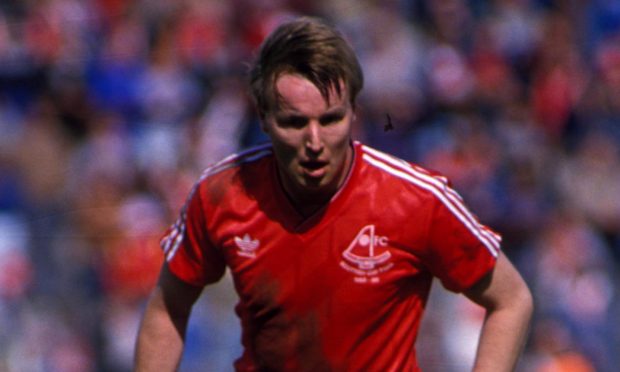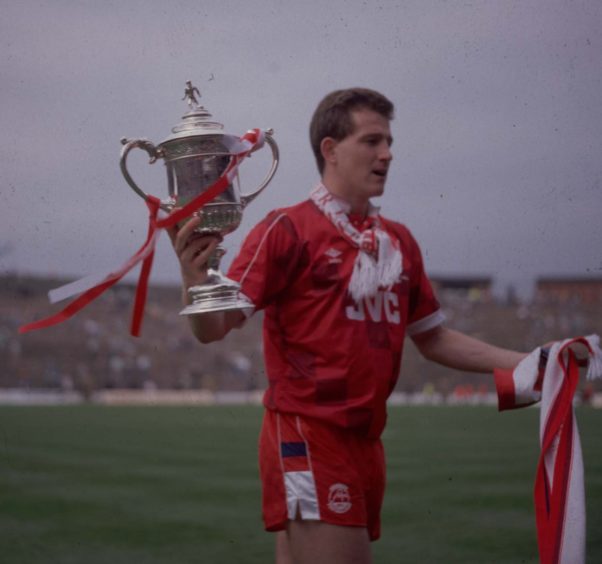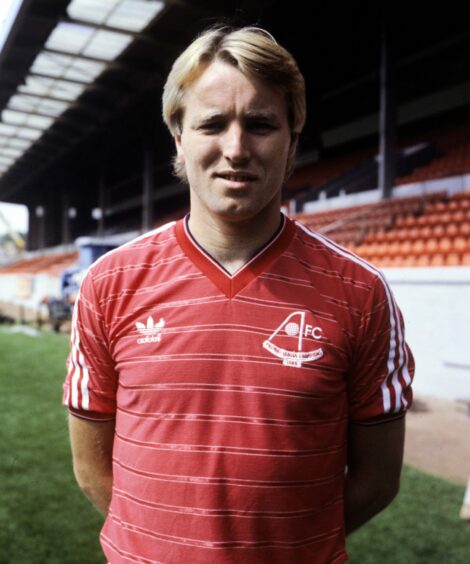Brian Irvine revealed how his late Aberdeen team-mate Frank McDougall knew his career was going to be ended by back pain just hours after the Reds lifted the Scottish Cup in 1986.
The former Dons striker, who died at the age of 65 due to heart complications at the weekend, was a phenomenal finisher and will forever be a fans’ favourite at Pittodrie.
McDougall spent just two years at Aberdeen from 1984, but his goals helped Alex Ferguson’s Reds win the Premier Division title in 1984/85 and then a League Cup and Scottish Cup double the following season.
The 3-0 Scottish Cup final win against Hearts in 1986 was to be his penultimate appearance for Aberdeen due to back issues.
After a summer tour, he would manage just one more outing – a 4-0 Premier League win against Hibernian – the following season before being forced to retire while still in his late-twenties.
When he hung up his boots, McDougall had netted 44 goals in only 69 Aberdeen outings, including a famous four-goal haul against Celtic in November 1985.
Ex-Dons centre-back Irvine recalled the bittersweet moment where McDougall, having helped Aberdeen win the 1986 Scottish Cup against the Jambos, confided in Irvine his fear it would be the final act of his playing career.
He said: “I remember one of Frank’s last games – I wasn’t playing, but I was on the bench for the Scottish Cup final (in 1986 v Hearts).
“I played well the week before against Clydebank, while Alex McLeish and Willie Miller were rested. Sir Alex Ferguson allowed me to sit on the bench – which was literally a bench – at Hampden that day (the two substitutes were Billy Stark and Joe Miller).
“Frank played so well in the final. John Hewitt scored twice and Billy Stark got the other.
“I remember speaking to Frank at the post-match reception at the Craw’s Nest, and he said to me: ‘my back’s gone’.
“He had just played a magnificent game and he told me his back was gone and he felt he’d be unable to continue. He must have been playing through the pain.
“Not only was he playing, but he was able to perform so well, despite his back issue.
“His game was not about running about all over the park – it was about being in the right place at the right time.”
McDougall made ‘such a fantastic impact’ at Dons
Irvine, who went on to score the winning penalty against Celtic in the 1990 Scottish Cup final – another cup double-winning Dons season – reflected on the sad news of McDougall’s passing.
McDougall was inducted into Aberdeen’s hall of fame last year, and Irvine said: “I knew Frank had been unwell, but it was still a shock.
“In football, we sometimes think we’re all like Peter Pan, but that’s not what happens. At 65, he was still relatively young.
“It’s sad for his team-mates and supporters, for whom he gave lots of great memories. It only seems like yesterday.
“He was such a prolific scorer. In such a short time at Aberdeen, he made such a fantastic impact.
“In the two years there, he probably achieved as much as a lot would in 10 years at the club. He won the fans’ hearts with his hat-tricks against Celtic and Rangers.
“He was also great in European games – I think it was against Servette he scored in a 1-0 win.
“Frank – who was what we’d call a ‘character’ – was such a really nice, humble guy. He was a great team-mate.
“It was great he got the chance last season to come out in front of the fans, who showed their appreciation to him.”
‘Frank was similar to Duncan Shearer with ball-striking talent’ – Irvine
Irvine thinks McDougall was similar to another ex-Dons striker, Duncan Shearer – at his best in and around the box.
He added: “Frank was such a good goalscorer wherever he went.
“He was a great striker of the ball.
“It was such a gift he had, always being in the right place at the right time. Duncan Shearer used to do that.
“You have to conserve your energy as a striker. You can’t be running to close players down all over the pitch.
“You have to be sharp to take your chance to score when it comes along.
“Frank and Duncan were like that and they were both great strikers of the ball.
“I remember watching them at training and they’d hit such clean strikes.
“In a game, they’d fire it into the back of the net.
“Someone else might not catch it right and the chance would be gone.”





Conversation